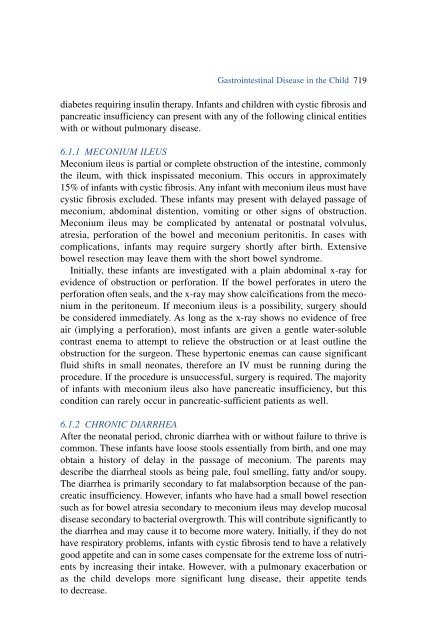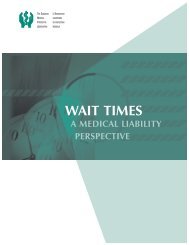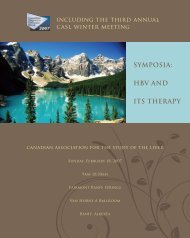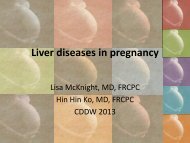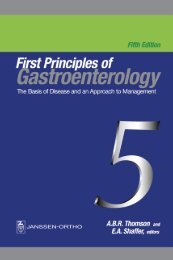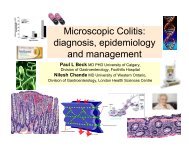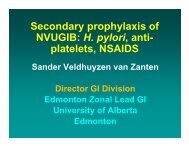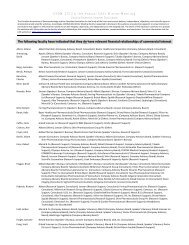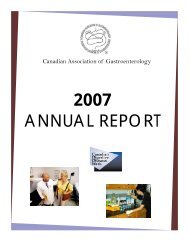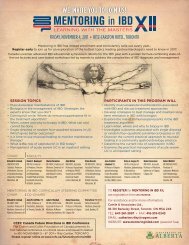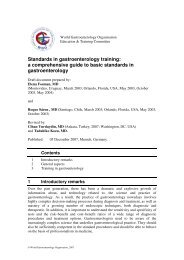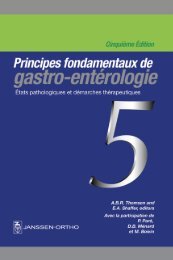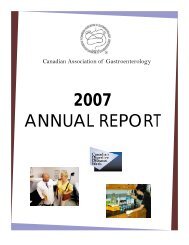Manifestations of Gastrointestinal Disease in the Child
Manifestations of Gastrointestinal Disease in the Child
Manifestations of Gastrointestinal Disease in the Child
Create successful ePaper yourself
Turn your PDF publications into a flip-book with our unique Google optimized e-Paper software.
<strong>Gastro<strong>in</strong>test<strong>in</strong>al</strong> <strong>Disease</strong> <strong>in</strong> <strong>the</strong> <strong>Child</strong> 719<br />
diabetes requir<strong>in</strong>g <strong>in</strong>sul<strong>in</strong> <strong>the</strong>rapy. Infants and children with cystic fibrosis and<br />
pancreatic <strong>in</strong>sufficiency can present with any <strong>of</strong> <strong>the</strong> follow<strong>in</strong>g cl<strong>in</strong>ical entities<br />
with or without pulmonary disease.<br />
6.1.1 MECONIUM ILEUS<br />
Meconium ileus is partial or complete obstruction <strong>of</strong> <strong>the</strong> <strong>in</strong>test<strong>in</strong>e, commonly<br />
<strong>the</strong> ileum, with thick <strong>in</strong>spissated meconium. This occurs <strong>in</strong> approximately<br />
15% <strong>of</strong> <strong>in</strong>fants with cystic fibrosis. Any <strong>in</strong>fant with meconium ileus must have<br />
cystic fibrosis excluded. These <strong>in</strong>fants may present with delayed passage <strong>of</strong><br />
meconium, abdom<strong>in</strong>al distention, vomit<strong>in</strong>g or o<strong>the</strong>r signs <strong>of</strong> obstruction.<br />
Meconium ileus may be complicated by antenatal or postnatal volvulus,<br />
atresia, perforation <strong>of</strong> <strong>the</strong> bowel and meconium peritonitis. In cases with<br />
complications, <strong>in</strong>fants may require surgery shortly after birth. Extensive<br />
bowel resection may leave <strong>the</strong>m with <strong>the</strong> short bowel syndrome.<br />
Initially, <strong>the</strong>se <strong>in</strong>fants are <strong>in</strong>vestigated with a pla<strong>in</strong> abdom<strong>in</strong>al x-ray for<br />
evidence <strong>of</strong> obstruction or perforation. If <strong>the</strong> bowel perforates <strong>in</strong> utero <strong>the</strong><br />
perforation <strong>of</strong>ten seals, and <strong>the</strong> x-ray may show calcifications from <strong>the</strong> meconium<br />
<strong>in</strong> <strong>the</strong> peritoneum. If meconium ileus is a possibility, surgery should<br />
be considered immediately. As long as <strong>the</strong> x-ray shows no evidence <strong>of</strong> free<br />
air (imply<strong>in</strong>g a perforation), most <strong>in</strong>fants are given a gentle water-soluble<br />
contrast enema to attempt to relieve <strong>the</strong> obstruction or at least outl<strong>in</strong>e <strong>the</strong><br />
obstruction for <strong>the</strong> surgeon. These hypertonic enemas can cause significant<br />
fluid shifts <strong>in</strong> small neonates, <strong>the</strong>refore an IV must be runn<strong>in</strong>g dur<strong>in</strong>g <strong>the</strong><br />
procedure. If <strong>the</strong> procedure is unsuccessful, surgery is required. The majority<br />
<strong>of</strong> <strong>in</strong>fants with meconium ileus also have pancreatic <strong>in</strong>sufficiency, but this<br />
condition can rarely occur <strong>in</strong> pancreatic-sufficient patients as well.<br />
6.1.2 CHRONIC DIARRHEA<br />
After <strong>the</strong> neonatal period, chronic diarrhea with or without failure to thrive is<br />
common. These <strong>in</strong>fants have loose stools essentially from birth, and one may<br />
obta<strong>in</strong> a history <strong>of</strong> delay <strong>in</strong> <strong>the</strong> passage <strong>of</strong> meconium. The parents may<br />
describe <strong>the</strong> diarrheal stools as be<strong>in</strong>g pale, foul smell<strong>in</strong>g, fatty and/or soupy.<br />
The diarrhea is primarily secondary to fat malabsorption because <strong>of</strong> <strong>the</strong> pancreatic<br />
<strong>in</strong>sufficiency. However, <strong>in</strong>fants who have had a small bowel resection<br />
such as for bowel atresia secondary to meconium ileus may develop mucosal<br />
disease secondary to bacterial overgrowth. This will contribute significantly to<br />
<strong>the</strong> diarrhea and may cause it to become more watery. Initially, if <strong>the</strong>y do not<br />
have respiratory problems, <strong>in</strong>fants with cystic fibrosis tend to have a relatively<br />
good appetite and can <strong>in</strong> some cases compensate for <strong>the</strong> extreme loss <strong>of</strong> nutrients<br />
by <strong>in</strong>creas<strong>in</strong>g <strong>the</strong>ir <strong>in</strong>take. However, with a pulmonary exacerbation or<br />
as <strong>the</strong> child develops more significant lung disease, <strong>the</strong>ir appetite tends<br />
to decrease.


